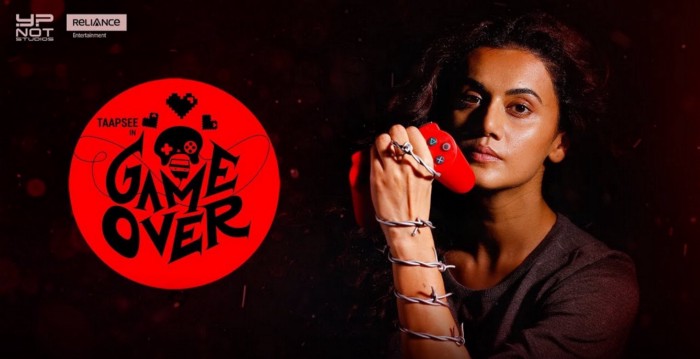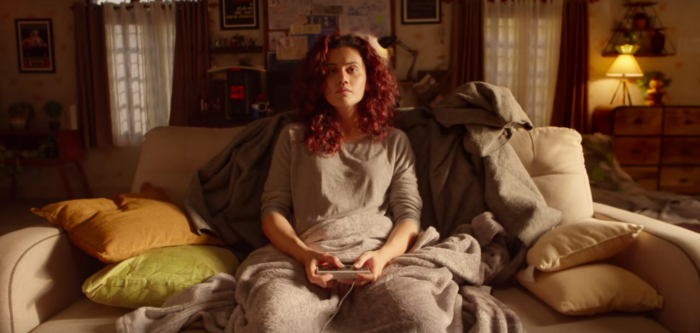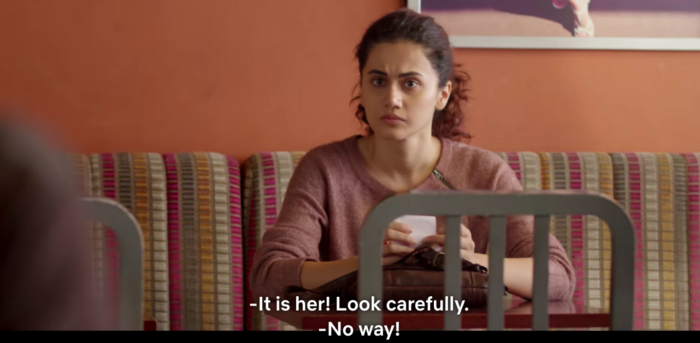
Game Over (2019, Netflix) is one of those rare horrors treats that’s as creative and interesting as it is fun to watch. Psychology blends with the supernatural and a dash of slasher-flick to create a full-bodied thriller with plenty of twists and turns to keep you guessing up to the very end. The film’s protagonist is also a three-time ‘Cluvie — Indian, female, and neuro-atypical. This is a thinking person’s horror movie for the “woke” crowd with just enough blood to satisfy slasher fans.
Spoilers ahead.

For those with a weak stomach for gore, the first five minutes of this film are not going to make you happy. Through the eyes of a stalker, we see a young woman going about her evening, completely unaware she’s being taped on video and followed. Her stalker captures her, tortures her, and kills her, all while we are forced to watch through his video recording. There’s a certain Psycho quality to this sequence, especially when we see the victim (via video) through a shower curtain.
Cut to a year later. Swapna (the incredibly talented Taapsee Pannu) is a video game designer who appears to be just living her life as normally as possible. Her live-in housekeeper Kalamma (Vinodhini Vaidynathan) reminds Swapna that it’s almost New Year’s. This triggers Swampna’s PTSD; later in the film, we’ll learn that at a party last New Year’s Eve, Swapna was bound, gagged, and sexually assaulted in a dark room. She now fears the dark and suffers from panic attacks. Adding insult to injury, her ordeal was caught on camera and uploaded for titillation. She’s recognized when she goes out for coffee, but her “fans” are turned on rather than ashamed.

Swapna also has a gamer tattoo on her forearm. Her tattoo was accidentally made with “memorial” ink; ink mixed with someone’s ashes. The mother of the first victim (whose name was Amrutha) was meant to be tattooed with her daughter’s ashes. The two women meet face to face and Amrutha’s mother finds closure.
Game Over beautifully pulls off something other horror films either neglect or get wrong: survivor trauma. Swapna and Amrutha have already gone through Hell when we meet them. Swapna is still less than a year away from her brutal sexual assault; Amrutha, we learn, was a three-time cancer survivor, thus the three identical tattoos on her forearm.

The film’s killer is denied a motive or an identity. Instead, he becomes a stand-in for the long, grueling process that many trauma survivors have to endure. Especially for survivors of sexual assault, the judgments of society can feel like a loss of control over their own narratives. Swapna’s parents blame her for what happened. They all but say, “You were asking for it.” She even blames herself for not fighting harder. Swapna’s complex emotions and PTSD eventually drive her to attempt suicide multiple times, one of which breaks both her legs and confines her temporarily to a wheelchair.
Amrutha’s mother is much more supportive of her daughter’s ordeal. During their meeting, she shows loving-kindness towards Swapma. This, in turn, provides Swapna with the strength she’ll need later in the film.

There’s a supernatural element to this film that doesn’t feel weird or forced. Long before Swapna learns that she has an accidental memorial tattoo, she starts to feel something prick inside of it. It’s not a coincidence that the film’s killer finds Swapna shortly after she learns of her ink’s history — and on the one-year anniversary of her assault. By now she’s as low as can be, both physically and emotionally. She can’t walk. She’s covered in cuts and bruises from her attempted suicide. It’s New Year’s, which marks the first full year since her assault. The power is cut and she’s now in the dark. All her triggers are happening at once. Swapna is no Sidney Prescott; she’s not a natural-born fighter ready to kick-ass the moment danger rears its ugly head. Only with a little supernatural help, is Swapna able to finally defeat her monsters.

Part of Game Over’s greatness comes in watching this woman at rock bottom using only her wits and gaming skills (and, possibly, a little supernatural help) to defeat the monster. Her trusty sidekick Kalamma never questions Swapna; as soon as the film’s climactic finale begins, Kalamma levels up and jumps in. It’s women helping women all the way through the movie.
Another part of what makes Game Over such a worthwhile horror watch is that it comes out hot, slows down to a well-paced, smoldering character study, and then explodes with the kind of twisty, turn-y action that slasher fans love. Game Over will not be easily categorized into one or another type of horror movie, just as Swapna and Amrutha will not easily be categorized as just another set of slasher victims.

Movie Review originally published by Meredith Morgenstern on Medium
Comments